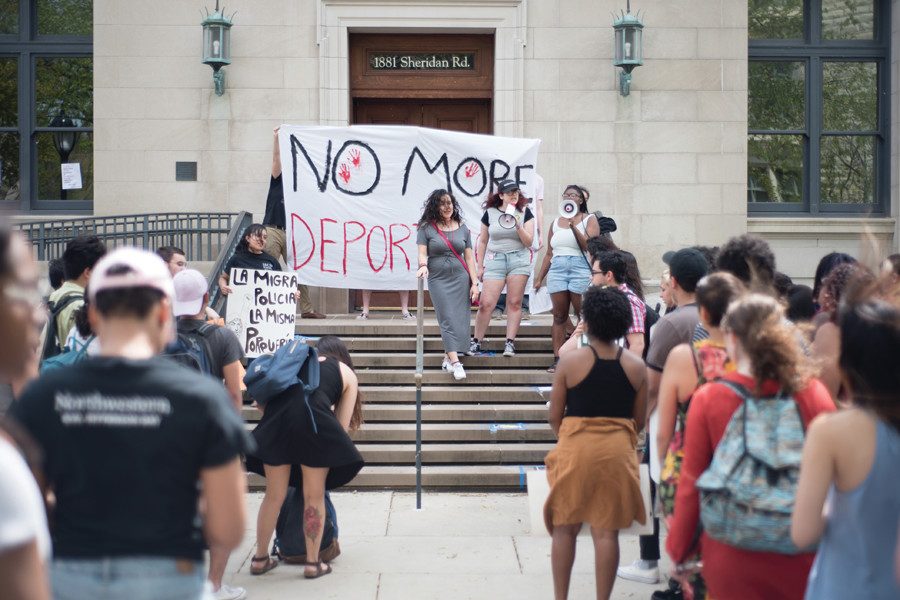Student coalition demands change to protest policy, plans to meet with administration
Daily file photo by Colin Boyle
Students gathered outside Harris Hall to protest the visit of an Immigration and Customs Enforcement representative in May. A student coalition plans to meet with administrators this quarter to revise Northwestern’s protest policy.
January 10, 2018
In a December op-ed for the Chicago Tribune, University President Morton Schapiro defended the importance of free speech and safe spaces. When balancing the two, he wrote, “it helps to have clear rules.”
Yet from the experience of Weinberg junior Madisen Hursey, the rules governing Northwestern students’ own rights to demonstrate remain ambiguous.
“The language is super vague and can be used in kind of any way the administration would want to apply to any student,” Hursey said. “We didn’t think that was really fair to students who were going to protest, because if you’re going to break a rule, you should at least know what the rule is.”
Hursey is a member of The Coalition for Free Speech and Unusual Noise, which formed Fall Quarter partially in response to how NU handled student protests against an ICE representative in May.
The Coalition now plans to meet with Vice President for Student Affairs Patricia Telles-Irvin to begin addressing their concerns with the University Disruption and Demonstration Policy. After a meeting last quarter between Telles-Irvin and several coalition representatives, coalition member Ana Acevedo said Telles-Irvin seemed “very open” to further collaboration.
Telles-Irvin confirmed in an email to The Daily that a meeting will take place this quarter. After discussing issues with representatives last quarter, she said she will meet with a larger group to begin addressing their concerns.
The Coalition had released a communal statement on Dec. 4, identifying itself as “a nonpartisan, inclusive group of concerned students and student activists fighting for freedom of speech.” Eighteen groups and 59 individuals had signed the statement as of Tuesday.
The statement set a deadline of Feb. 2 to establish dialogue with the University, Acevedo said. The McCormick senior said the coalition planned to become more “aggressive” with demonstrations against the current protest policy if they didn’t hear any updates from administrators by then.
However, Acevedo said it seems unlikely the coalition will have to use such methods.
The Coalition statement demands four changes to the University’s policy, including more specific language and consistent updates — every two years instead of every three.
The other two demands involve the protest registration process, which is currently handled by the Dean of Students Office and requires that organizers list responsible individuals. The Coalition believes a different office, like Student Organizations and Activities, should oversee registration and that a group name should be sufficient to identify organizers, Acevedo said.
“We just want to remove the whole registering a protest underneath the same place you would get disciplined if the protest goes wrong,” she said.
Hursey said she and other coalition members also met with Provost Jonathan Holloway last quarter and found him to be receptive to their concerns.
But though administrators may wish to help students, Acevedo said, their lack of familiarity with the policy may put them in a difficult situation.
“If you’re coming from someone who’s overseeing versus someone who’s trying to live under the rules of it, it’s very different,” she said. “If you yourself are not demonstrating and not trying to organize a protest … you wouldn’t know how it’s vague.”
Acevedo said she believes all The Coalition’s demands can be met by the end of Winter Quarter, or the beginning of Spring Quarter at the latest.
Hursey said she believes administrators are mainly concerned with whether protests silence the original speaker.
Schapiro wrote in his op-ed that it is not his place to decide which speakers are appropriate for campus. He said students should express themselves but “not at the expense of someone’s right to hear opposing viewpoints.”
And while she doesn’t believe the University intentionally tries to silence certain groups of people, Hursey said the unclear rules often affect marginalized communities, who are more likely to speak up against the “status quo.”
“(Administrators) are pretty quick to assume that a student group that wants to make some kind of noise is trying to be silencing to the opposition, which isn’t always true,” Hursey said. “A lot of times they’re trying to make noise to say ‘We’re here, too,’ but not to say ‘We’re here instead.’”
Email: [email protected]
Twitter: @madsburk


